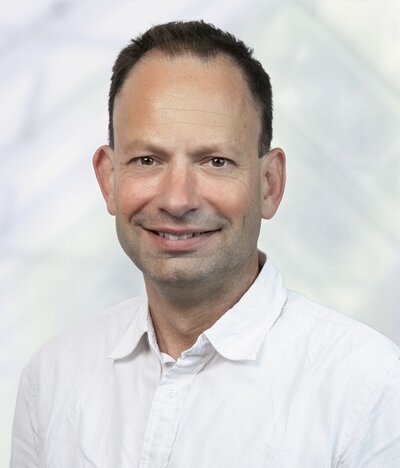Natal van Riel
Department / Institute
Group

RESEARCH PROFILE
Natal van Riel is Professor of Biomedical Systems Biology at the department of Biomedical Engineering at Eindhoven University of Technology, where he leads the Computational Biology group and the Systems Biology and Metabolic Diseases research program. He is also part-time Professor of Computational Modelling at Amsterdam University Medical Centers (location AMC, University of Amsterdam's Faculty of Medicine). His research focuses on modelling of metabolic networks and physiology, machine learning for parameter estimation, methods for analysis of dynamic models, and applications in Metabolic Syndrome and associated diseases such as Type 2 Diabetes.
The role of bile acids in the complex interaction between gut microbiome and metabolic health is currently an important research focus in his group (e.g. in the RESOLVE project in collaboration with Amsterdam UMC). Within the NWO program ‘Complexity in Health and Nutrition’, Natal van Riel also focuses on modelling the digestion and metabolism of nutrients in the project ‘Metabolic adaptation, transitions and resilience in overweight individuals’. In cooperation with the Catharina hospital in Eindhoven he has developed the Metabolic Health Index (MHI) to quantify the benefit of bariatric surgery to resolve metabolic diseases (type 2 diabetes, dyslipidemia), which is a second important outcome of the surgical treatment in addition to weight reduction. He develops metabolic 'digital twins' of human individuals to enable predictive, preventive, personalized, and participatory medicine. In the DiaGame project digital twins are developed to empower patients with diabetes in self-management of their disease.
In the past decade Systems Biology has become an established methodology for integrative and quantitative life science research. It is our goal to translate Systems Biology to biomedical and medical research and education to understand, cure and prevent diseases.
ACADEMIC BACKGROUND
Natal van Riel studied Electrical Engineering at Eindhoven University of Technology (TU/e, The Netherlands) where he was trained in system identification and control engineering. After receiving his MSc degree in 1995, he started PhD research in the Biotechnology group of Unilever Research Vlaardingen (The Netherlands) under supervision of Prof. Theo Verrips, on integrating computational modelling and experiments to study cell metabolism. In 2000, he obtained his PhD from Utrecht University (The Netherlands). From 2000 to 2003, he worked in the department of Electrical Engineering of TU/e, investigating the application of system and control theory to understand biological processes. In 2003, he was appointed as Assistant Professor in the department of Biomedical Engineering at TU/e where he initiated Systems Biology research. This was expanded when he joined the group of Prof. Peter Hilbers in 2006, to lead the Computational Systems Biology research program, investigating complex, multi-factorial diseases. In 2014, Natal van Riel was appointed Associate Professor of Systems Biology and Metabolic Diseases. In that same year he was a visiting scholar of the department of Bioengineering at the University of California San Diego (UCSD) in the group of Prof. Bernhard Palsson. In 2015, he was appointed part-time Professor of Computational Modelling at the Academic Medical Center AMC (University of Amsterdam). In 2019, he was appointed full Professor of Biomedical Systems Biology at TU/e. In 2023 he became head of the Computational Biology group at TU/e.
Recent Publications
-
Balázs Erdős,Shauna D. O'Donovan,Michiel E. Adriaens,Anouk Gijbels,Inez Trouwborst,Kelly M Jardon,Gijs H Goossens,Lydia A Afman,Ellen E Blaak,Natal A W van Riel
Leveraging continuous glucose monitoring for personalized modeling of insulin-regulated glucose metabolism
Scientific Reports (2024) -
Marcus de Goffau,Natal van Riel,Bert-Jan van den Born,Henrike Galenkamp,Koos Zwinderman,Max Nieuwdorp,Evgeni Levin
Ethnic variations in metabolic syndrome components and their associations with the gut microbiota
Genome Medicine (2024) -
Eveline H J Mestrom,Jonna A van der Stam,Simon W Nienhuijs,Ignace H J T de Hingh,Arjen-Kars Boer,Natal A W van Riel,Volkher Scharnhorst,R Arthur Bouwman
Postoperative circadian patterns in wearable sensor measured heart rate
Journal of Clinical Monitoring and Computing (2024) -
Danilo Ferreira de Carvalho,Uzay Kaymak,Pieter Van Gorp,Natal A.W. van Riel
Data-driven meal events detection using blood glucose response patterns
BMC Medical Informatics and Decision Making (2023) -
Vehpi Yildirim,Vivek M. Sheraton,Ruud Brands,Loes Crielaard,Rick Quax,Natal A.W. van Riel,Karien Stronks,Mary Nicolaou,Peter M.A. Sloot
A data-driven computational model for obesity-driven diabetes onset and remission through weight loss
iScience (2023)
Ancillary Activities
No ancillary activities